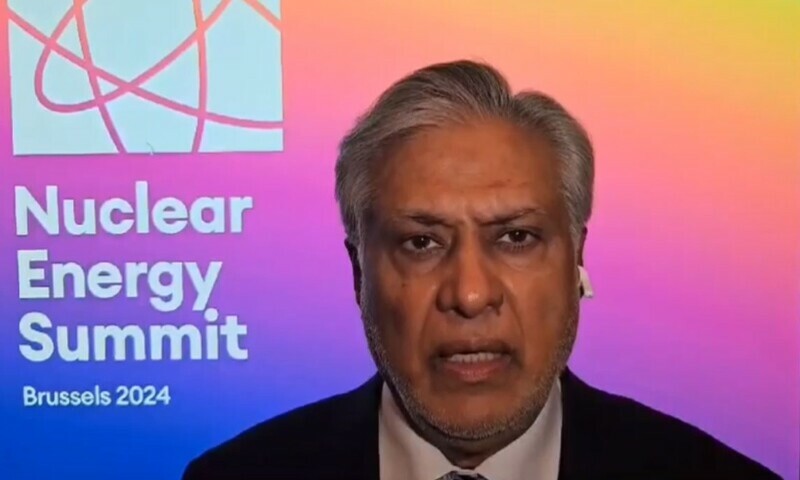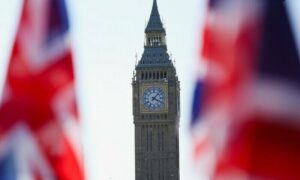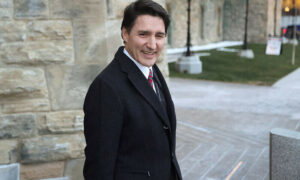Foreign Minister Ishaq Dar on Friday called for “aggressive financing” of nuclear energy projects, citing climate vulnerability of developing countries to be the major reason of the initiative.
He made the remarks in a video message issued on the sidelines of the first Nuclear Energy Summit in Brussels. He hailed the summit as a positive development for discussing alternative energy for countries vulnerable to climate change.
“So the summit is going well. Different ideas have been put forth. We have also supported this,” he said, adding that Pakistan already had nuclear energy capacity of more than 3,500 megawatts.
He highlighted that Pakistan was also building another nuclear power plant, Chashma C-5, with the cooperation of China.
“Nuclear is the safest option — it is safe and cost effective. And the world currently needs it,” the foreign minister said. He noted that multilateral international institutions were reluctant to finance such projects.
“However, a global opinion is emerging […] I strongly urged multilateral lenders to consider aggressive financing so that developing countries can also make use of nuclear energy,” he said.
FM Dar added that the when the summit began, a large number of leaders and delegations agreed that such financing by multilateral institutions was needed.
Meetings with UAE, China on sidelines of summit
Dar also met with the UAE Minister of Energy and Infrastructure Almazrouel Suhail on the sidelines of the summit. According to the Foreign Office (FO), the two ministers reviewed the state and potential of bilateral relations.
“They expressed their desire to further enhance Pakistan-UAE relations particularly trade and investment in renewable energy and transport sectors,” it said.
Dar expressed confidence that the conclusion of Pakistan-UAE Comprehensive Economic Partnership Agreement (CEPA) would lead to further enhancement of bilateral trade and investment cooperation, it added. Meanwhile, the UAE minister underscored that the country would be a partner in development for Pakistan.
Dar also met with Chinese Vice Premier Zhang Guoqing in Brussels. According to the FO, the two appreciated the strategic partnership between the two countries.
“They agreed on the importance of the longstanding cooperation between Pakistan and China in civil nuclear technology. They also agreed to further advance and expand China-Pakistan Economic Corridor to strengthen cooperation in diverse fields including industry, mining, and information technology,” it said.
Pakistan seeks global support for nuclear energy projects
A day earlier, Dar had met with International Atomic Energy Agency (IAEA) Director General Rafael Mariano Grossi. During the meeting, he had called for the international financial institutions and banks to support nuclear energy projects in developing countries to enable them to meet their energy needs and achieve zero emissions goals.
The minister appreciated the IAEA’s role in enhancing peaceful uses of nuclear technology. He said Pakistan desired to enhance the share of nuclear energy in the energy mix and underscored the importance of IAEA’s technical cooperation work.
Grossi appreciated Pakistan’s collaboration with the agency, adding that in Asia Pakistan is playing a key role in sharing its experience and expertise with developing countries. He said he would soon engage with global financial institutions to resolve the matter.
Meanwhile, in a statement issued by the Ministry of Foreign Affairs on Thursday, Dar said energy security stands high on global priorities — for both developing and the developed world.
“We need clean and cost-effective energy. With immense power density, negligible carbon footprints and no Greenhouse emissions, nuclear energy offers a viable solution for the future,” the statement quoted the minister as saying. “We endorsed nuclear energy as one of the low-emission technologies in the recent COP-28,” he pointed out.
The minister said, “We wish to further enhance our cooperation on initiatives of DG IAEA including ‘Atoms4NetZero’, ‘Atoms4Food’, ‘Rays of Hope’, ‘Zodiac’, ‘NUTEC Plastics’ and ‘Marie Curie fellowships’.”
Dar emphasised three points for further development of nuclear energy — access to technology, financing nuclear power projects and increasing the IAEA’s technical cooperation fund.
Dar also held a meeting with Azerbaijan’s Foreign Minister Jeyhun Bayramov on the margins of the summit. The two sides exchanged views on prospects of cooperation in the fields of economy, transport and communication and on preparatory work for climate summit in Azerbaijan and post-conflict regional situation.







